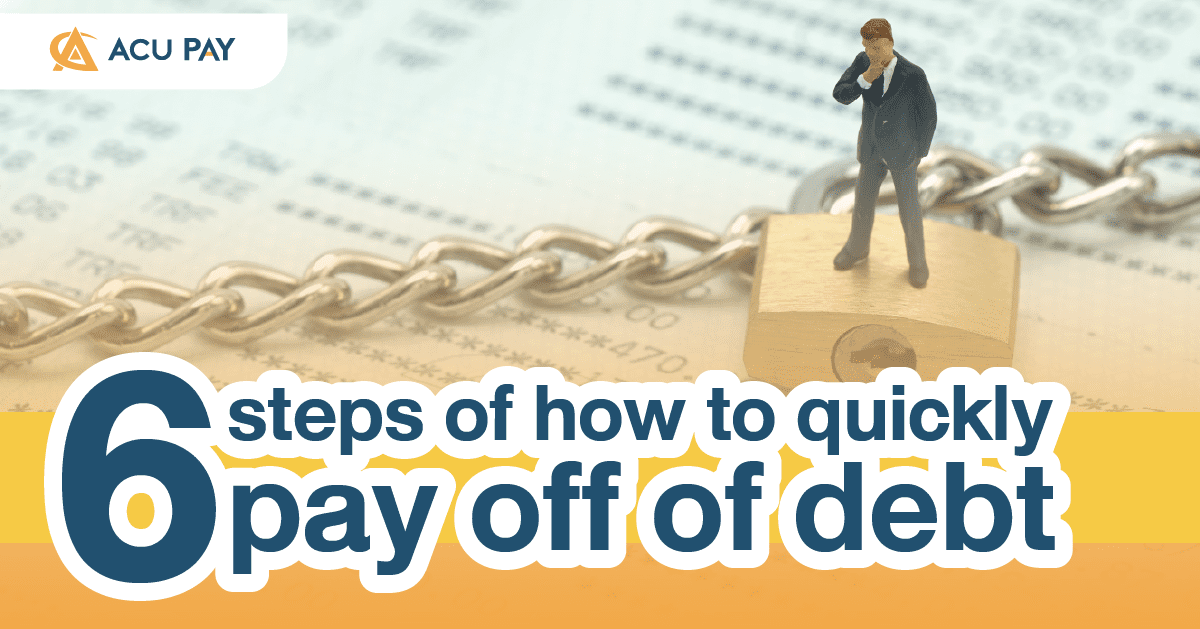

“Debt” is the word that many people don’t want to hear because being in debt means being under a burden and lacking spending liquidity. The more debt you have, the more interest you get, you may need to borrow or refinance your debt. If you are in debt, how can you manage it? ACU PAY will share tips that can make you pay off your debt quickly.
Many people in debt may feel that negative thoughts often go around their heads, whether guilt or overthinking. When confronted with such a state of mind, first of all, accept the fact that we have created debt, then try to concentrate and find solutions to the problem by not creating more new debt and not getting a new loan to pay off the old debt because it will cause you more debt. If you get through this first stage, the faster you’ll be able to get out of debt.
Make a list of all liabilities to learn more about your spending behavior. When you know the cause of debt, before starting to solve debt problems, you should divide the debt into two parts:
1. Good debt.
If there is a short-term crisis, keep good debt and sell bad debts. If the debt grows large, consider whether using good debt to pay off large debts is worth it.
If it is a Loan shark, it should be transferred back to the system. A loan from financial institutions in the system may be sought first to reduce interest burdens and then pay installments with financial institutions as follows.
“Pay the most expensive interest first” such as non-credit card debt to reduce the burden on each month or “Pay low outstanding debts first” to reduce creditors’ numbers, and encourage debt repayment.
This will start with “reduction of unnecessary expenses” to pay off debt, or “get an extra job” to increase liquidity each month, or the last way is “to sell assets for repayment” to stop the huge interest burden and then plan on buying new assets once you can pay off debt and your finance status ready.
If we have a good plan, but we don’t start with the plan, debt repayment will never work. So carrying out the plan will help us to repay all debt more quickly than having no plan at all.
There may be negotiations with creditors to reduce the monthly installment amount, interest, fines, fees or other special offers. There are two methods that can be applied:
Negotiations to reduce the monthly burden, e.g., partial repayment of debts, extension of repayment period by 1-2 years, reduce the amount payable in each installment period, etc.
Negotiation for debt cut-off or reduction in exchange for paying back the debt in lump sum immediately and then ending.
However, compounding a debt requires careful study of details and precautions so that what we decide does not become an additional burden later.
Stopping creating more debt won’t be enough. The most important thing is to “control costs,” learn to spend, know what is needed, and start “changing one’s spending habits,” change the wasteful spending behavior, turn to financial planning, and discipline yourself with savings goals such as retirement savings or investment. This is believed to change our spending habits in the long run.
It seems difficult to get rid of debt at first because it looks like we have to work hard to get money back. Nevertheless, more difficult than making more money to pay debt is to build up our own spending discipline or our intentions to implement our financial plan. As we walk out of the way we intended, an unexpected debt might show up, so try to follow these 6 steps mentioned above, and you will be guaranteed that you will pay off all your existing debt before you know it.